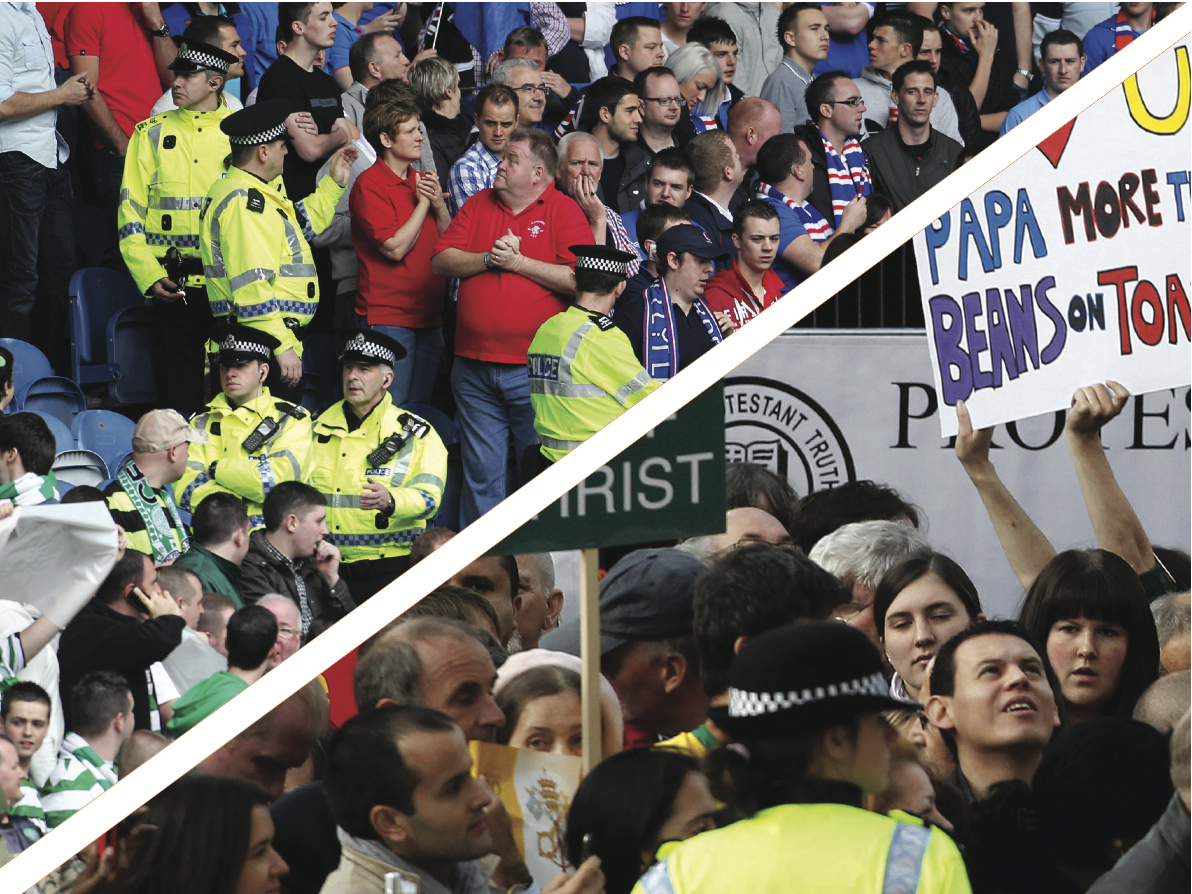January 6 | ![]() 0 COMMENTS
0 COMMENTS ![]() print
print

Anti-Catholicism old and new in 2012
— The Scottish Government legislated last year on sectarianism around football but secularism is the real enemy at the gate, says David Kerr
On August 24 1560, the Scottish Parliament outlawed the authority of Pope Pius IV and his successors in this country. After more than a thousand years, Catholic Scotland came to a dramatic and abrupt conclusion. The ongoing story of Scottish Catholicism, though, did not.
Today one in six Scots is Catholic. We are to be found in significant numbers across the land and throughout civil society. Meanwhile over 450 years after the passing of that Papal Jurisdiction Act, the Scottish Parliament now has Catholics sitting on all sides of the chamber including the government benches.
Yet, much of the recent public debate surrounding Holyrood’s controversial Offensive Behaviour at Football and Threatening Communications Bill could easily have us believe that we still inhabit a land riven by a century’s old sectarianism. Is that really the case? Allow me to make three observations that I hope prove helpful.
Firstly, while sounding attractively even-handed ‘sectarianism’ is an ultimately inaccurate description for the darker recesses of our recent religious history. Face facts, what we are dealing with here is historical anti-Catholicism or, more precisely, anti-Irish Catholicism.
It is telling that the infamous 1923 Church of Scotland report—entitled The Menace of the Irish race to our Scottish Nationality—excluded both Protestant Irish immigrants and native Catholic Scots from its withering analysis.
The Catholic Irish were also the target for those specifically Protestant political parties that enjoyed short-lived but significant success in both Glasgow and Edinburgh municipal elections in the early 1930’s.
From then on you rarely, if ever, find a public institution or private company—professional football clubs included—operating a ‘no Protestants’ policy. Sadly, however, the converse as regards Catholics was not always true.
Secondly, we should also caution ourselves against allowing our collective historic view to be solely informed by such shameful incidents.
As has been charted in recent years by historians such as Professor Tom Devine, mass Irish Catholic immigration in the 19th and early 20th century was actually more peaceably absorbed into Scotland than it was in either England or the United States.
This largely harmonious—albeit not always enthusiastically welcomed—integration culminated in the years of the First World War when the patriotism and bravery of the Scots-Irish Catholic immigrants was regularly and publically lauded by the civil authorities and national media.
Indeed, as Professor Devine himself has recorded, half a dozen first-generation immigrants actually won the Victoria Cross for their heroism. To give that achievement some scale, only six Victoria Crosses have been awarded in the past 43 years.
The war years also concluded with the passing of Section 18 of the 1918 Education (Scotland) Act that brought Catholic schools into the state sector while maintaining a Church veto over appointments and the curriculum.
It is reported that the offer made by the Liberal Secretary of State for Scotland, Sir Robert Munro, was so generous that the Vatican stepped in to instruct the bishops of Scotland to swiftly accept.
Ironically, the rise of inflammatory anti-Irish Catholic rhetoric in the subsequent inter-war years also coincided with the tailing off of immigration from Ireland to Scotland.
Therefore such intemperate incidents are perhaps better explained—although by no means excused—by the unprecedented years of austerity faced by Scottish industry and society following the Great War. After all, in times of hardship a scapegoat is often called for—and found.
It is also of some historical comfort that such sectarian views did not seem to find long lasting or widespread support throughout general society, the mainstream Scottish media or amongst any of our largest political parties.
Thirdly then, what of today? Certainly, Scotland 2011 does not seem to bear the hallmarks of a traditionally sectarian society when compared to, for example, Northern Ireland.
Most young Scots Catholics marry non-Catholics. The comparable percentage figure for young Northern Irish Catholics is in single digits. Scotland does not have—and never has had—neighbourhoods that are exclusively mono-religious. Even the famously ‘Protestant Bridgeton’ in Glasgow’s east end is 30 per cent Catholic. Our employment tribunals do not hear claims of job discrimination based on Catholic or Protestant identity.
Meanwhile, polls showed only 2 per cent of Scots were ‘strongly opposed’ to the visit of Pope Benedict XVI in September 2010 with over 125,000 turning out in Edinburgh to welcome the Holy Father to Scotland.
Yes, there is some anti-social behaviour linked to the rivalry between Glasgow’s two big football clubs but that should not immediately be presumed to constitute religiously motivated sectarianism or to betoken the tip of a deeper sectarian iceberg in Scottish society.
Nor should the scale of such unacceptable football-related behaviour be blown out of proportion. Much of our recent national angst seems to emanate from March’s Old Firm ‘game of shame,’ when both players and coaches behaved badly before a worldwide television audience. It should be remembered, however, that there were more Rangers players booked that evening than there were Celtic fans arrested.
As for sectarian inspired crimes, the statistics for 2010-11 show that there were over 76,000 assaults recorded in Scotland last year. Of them 39 were ‘aggravated by religious prejudice.’ And the most common victim of such crimes? In over 40 per cent of cases it was a police officer.
So is modern Scotland still informed by this historical form of anti-Catholicism? I don’t claim to offer a definitive answer but I do know that if we are to reach an accurate conclusion we have to attempt to recognise the true scale and nature of the problem.
For what it is worth, I believe we Scots are an exceptionally warm, welcoming and tolerant people. Almost exclusively, the only anti-Catholic bigotry I have ever experienced in my personal, political and professional dealings has been at the hands of those motivated by a zealous, secularising, social liberalism.
I would therefore suggest it is actually this new form of shrill, dogmatic and unforgiving anti-Catholicism that now most threatens our religious civil liberties—as well as the common good of Scottish society including the most vulnerable.
And, ironically perhaps, it is those most inspired by the Reformation Parliament of 1560 that are likely to be some of our greatest allies in the rhetorical battles that lie ahead.










